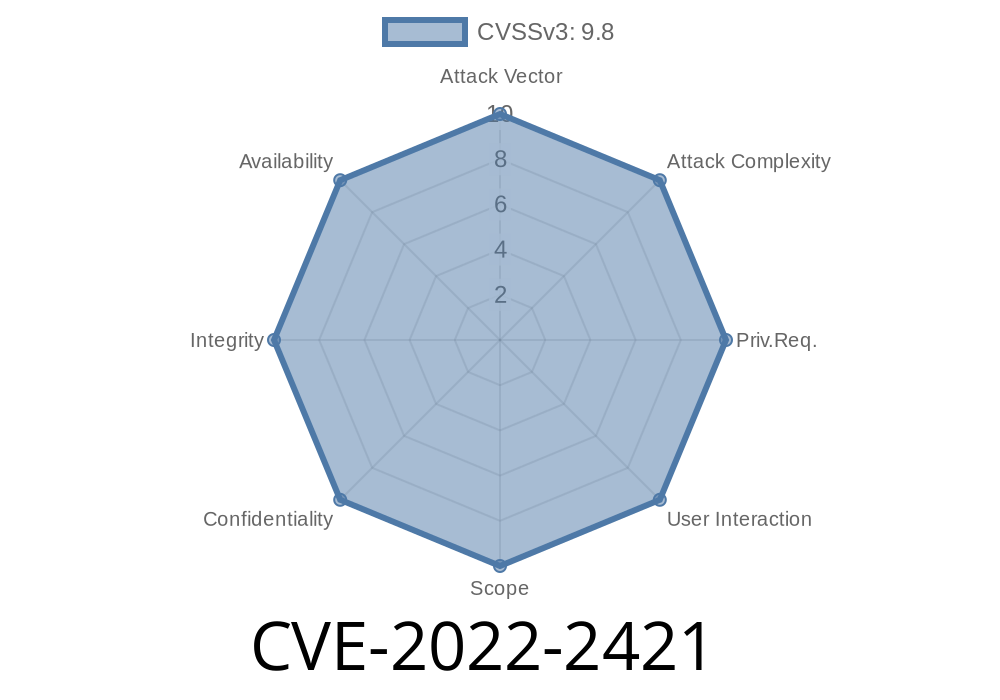In the world of JavaScript libraries, Socket.io stands out as one of the most widely used solutions for real-time, bi-directional communication between web clients and servers. Unfortunately, its popularity also makes it a juicy target for security researchers — and, occasionally, for attackers.
One such issue, tracked as CVE-2022-2421, is surprisingly subtle, but its impact can be significant. In this post, we'll break down the vulnerability, walk through example code, reference the disclosure sources, and illustrate how a determined attacker could exploit the flaw. No prior expert knowledge required — just bring your curiosity.
What is CVE-2022-2421?
This vulnerability stems from improper type validation during the attachment parsing phase in the Socket.io JavaScript library.
Let’s simplify that:
When parsing the data packets sent by clients, Socket.io tries to handle attachments (like files) using _placeholder objects. Due to not checking the types strictly enough, an attacker can _overwrite this _placeholder object with pretty much anything — including references to JavaScript functions.
When this happens, those function references may later get executed if the receiving code expects a harmless object instead.
Official Resources
- NVD - CVE-2022-2421
- Socket.io Security Advisories
- Original Disclosure Issue (GHSA-rm55-j6j2-8wh6)
Let’s imagine a typical (insecure) use of Socket.io on the server
const io = require('socket.io')(300);
io.on('connection', (socket) => {
console.log('New client connected!');
socket.on('file', (data) => {
// Assume data contains attachments and placeholders
const attachments = data.attachments;
// Do something with attachments (Danger zone!)
if (attachments && attachments._placeholder) {
// Using _placeholder without type checking!
processAttachment(attachments._placeholder);
}
});
});
If Socket.io’s parser failed to strictly type-check attachments._placeholder, then an attacker could overwrite this with a function. Consider the following malicious payload sent by the client:
{
"attachments": {
"_placeholder": "function() { require('child_process').exec('rm -rf /'); }"
}
}
But in JavaScript, it gets nastier. The attacker could inject code, and if the application mistakenly uses eval() or passes this value somewhere else, the function might execute:
// Simulating attacker-controlled _placeholder
const attackerPayload = {
_placeholder: () => { console.log('Exploit runs!'); }
};
processAttachment(attackerPayload._placeholder);
// Oops! This could execute arbitrary code if processAttachment just executes or uses this unchecked!
The actual exploit path depends on how the downstream code uses these objects. But, ultimately, this vulnerability is about replacing harmless structures with executable code.
Victim application uses vulnerable Socket.io parser (before 4..).
2. Attacker crafts a packet where an object property (_placeholder) is overwritten with a function (or any other dangerous reference).
3. If the server executes or evaluates the property, arbitrary code execution is possible within the server context.
Here’s a focused example with code:
Disclaimer: Never run untrusted code on production servers. Always test vulnerabilities in a sandboxed lab.
Vulnerable Packet Handler
function processAttachment(obj) {
// Simulate unsafe use
if (typeof obj === 'function') {
obj(); // Unintended code execution!
} else {
console.log('Safe:', obj);
}
}
const maliciousPacket = {
_placeholder: () => {
console.log('Exploit: attacker code executed!');
// In real life, could do far worse things
}
};
processAttachment(maliciousPacket._placeholder); // This runs the attacker's code
The Fix & Mitigation
Socket.io quickly moved to strictly validate types for the _placeholder field, only accepting expected value types (like boolean, number, or a plain object) and never a function.
Secure Check Example
function processAttachment(obj) {
if (typeof obj === 'object' && obj !== null && !Array.isArray(obj)) {
// Safe to use
console.log('Attachment processed:', obj);
} else {
console.error('Invalid attachment detected!');
}
}
Update to the latest Socket.io version
_See Upgrading Socket.io_
Conclusion
CVE-2022-2421 is a strong reminder that type validation is crucial — especially in JavaScript, where functions and objects blend so seamlessly. Though the shockwave from this vulnerability has passed (thanks to responsive maintainers), the lesson remains:
> Never assume the shape or safety of data coming from outside your application's trust boundary.
Links for further reading:
- Official Socket.io CVE-2022-2421 Advisory
- NVD Entry
- Socket.io Security Guide
Timeline
Published on: 10/26/2022 10:15:00 UTC
Last modified on: 11/02/2022 19:15:00 UTC
